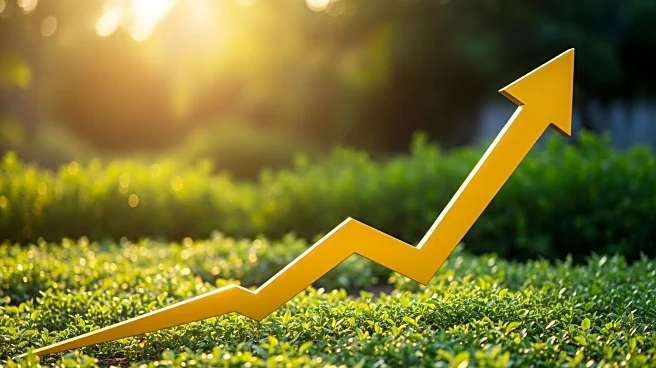What's Happening?
The U.S. economy experienced a significant boost in the second quarter of 2025, with the gross domestic product (GDP) growing at a rate of 3.8%, according to revised data from the Commerce Department. This marks the fastest growth in nearly two years and is an upgrade from the previously reported 3.3% growth rate. The revision is largely attributed to stronger consumer spending, which was adjusted upward from 1.6% to 2.5%. Despite concerns about the job market and inflation, consumer spending has remained resilient, indicating a willingness among consumers to maintain their purchasing habits. Additionally, business investments in intellectual property and equipment have contributed to this robust economic performance.
Why It's Important?
The revised GDP figures highlight the resilience of the U.S. economy amid ongoing challenges such as tariff uncertainties and a slowing labor market. The strong growth rate suggests that the economy is not currently at risk of recession, despite some concerns about uneven growth. The Federal Reserve's recent interest rate cuts aimed at stimulating economic growth may be reconsidered in light of this positive data. However, the reliance on tech sector investments, particularly in artificial intelligence, raises questions about the sustainability of this growth. If tech investments peak, other sectors will need to drive future economic expansion.
What's Next?
The Federal Reserve may need to reassess its monetary policy strategy, as the stronger-than-expected GDP growth could reduce the likelihood of further interest rate cuts. Investors have already adjusted their expectations for additional rate cuts this year. Meanwhile, the economy's dependence on tech sector investments suggests a need for diversification in growth drivers. Policymakers and businesses may need to explore alternative sources of growth to ensure long-term economic stability.
Beyond the Headlines
The current economic landscape underscores the importance of addressing income inequality, as lower- and middle-income households may not benefit equally from the economic growth. The tech sector's significant role in driving GDP growth also highlights the potential for technological advancements to reshape the economy. However, this reliance on tech investments could pose risks if such investments decline, necessitating a broader economic strategy to sustain growth.










